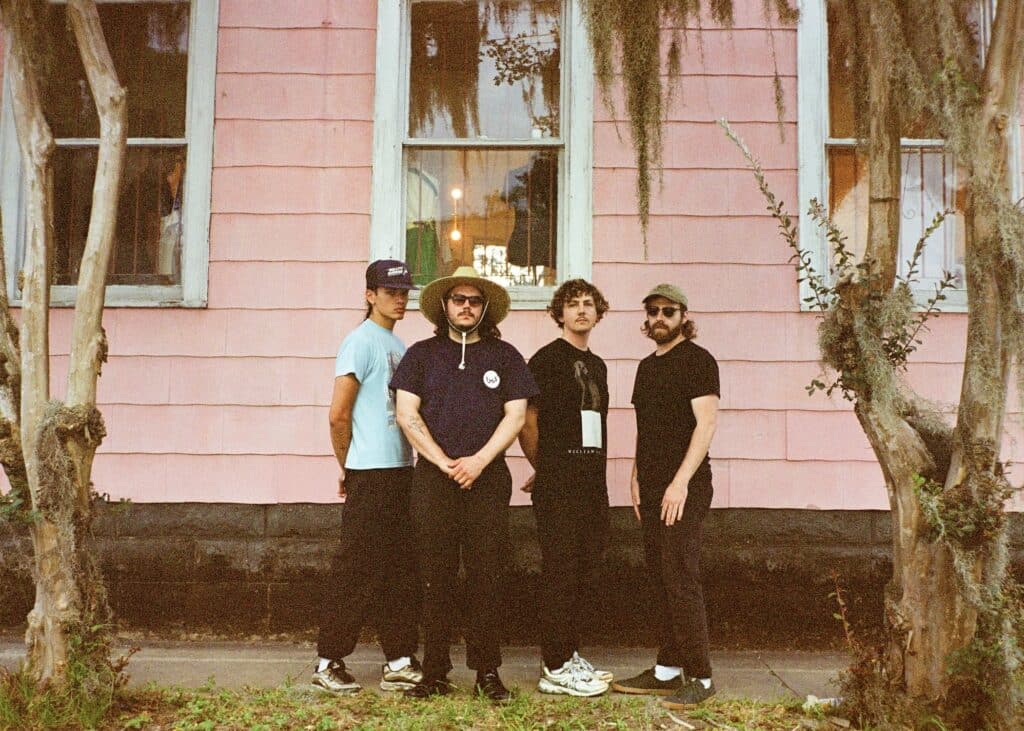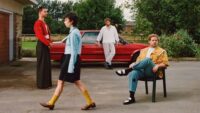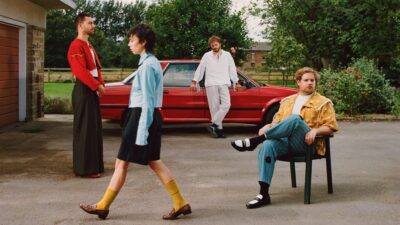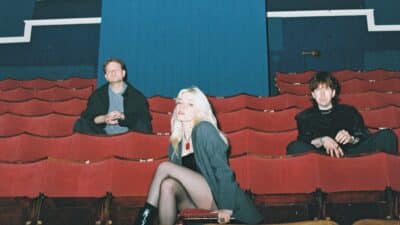Interview
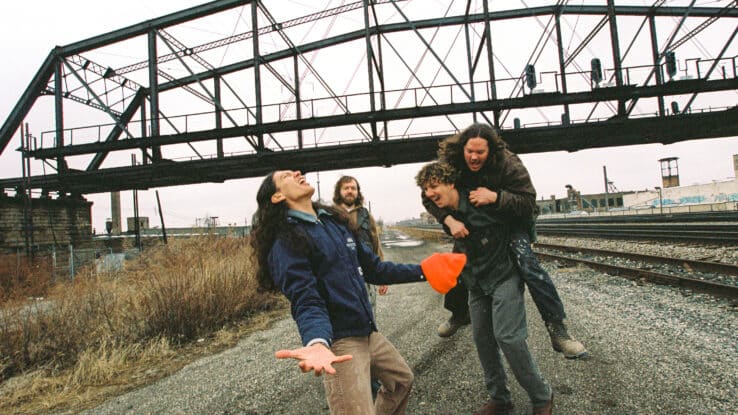
Interview
Deeper: “With this album we wanted to articulate who we are as people”
Ahead of a UK tour, the Chicago post-punks talk us through starting afresh on new album Careful!
A new album can often be an opportunity for a much needed fresh start for a band, as Chicago’s Deeper know well. Their last full-length, Auto-Pain, was released in January 2020, but was overshadowed the painful passing of their ex-guitarist Mike Clawson, and the looming pandemic. Interviews naturally focussed on the band’s struggles, which in the imagination of writers and listeners seemed to enflame the dark mood of the record.
Three years on, the band have signed to Sub Pop records and released their third album, Careful!, which has given Shiraz Bhatti, Kevin Fairburn, Nic Gohl and Drew McBride a fresh slate to express themselves and their music without the distraction of context.
As they prepare to embark on a UK tour, McBride and Fairburn talk us through starting again, performing at home at this year’s Pitchfork Festival, their take on post-punk and more.
Chicago has a blessed music history. How did it treat you as a band first starting out?
Drew McBride: I’m originally from Ohio, and when I moved to Chicago I was just thinking about how exciting the music scene was to me before I moved there. But I think something that became apparent upon moving there is that one of the most important ingredients for a really fertile music scene is just cheap rent. Straight up. The ability to take risks musically and pursue your passions is a lot easier when your rent isn’t $1000 (US dollars) or something like that. So that made it a lot easier for all of us to refine our chops in the city as we were coming up.
Kevin Fairburn: Yeah, and there’s a lot of people who had the same mindset; we were really lucky to be inspired by a similar but slightly different group of musicians. And we had the means, in that there was a lot of house shows, a lot of places where you could play a show and, you know, kind of suck. And that would be OK, you didn’t have to like get up on a eight foot high stage and play in a big empty room. I think that all helped us at a time that we probably weren’t ready to do that. Instead, we did things that filled the space that we were in, and we kind of went from there.
Well, from empty venues to playing the city’s own Pitchfork Festival. Tell me a little more about playing that.
DM: All of us grew up going to Pitchfork, and I guess to me as a musician, it’s something you might aspire to play a little bit more than playing something like Lollapalooza. You know, there’s a little more of a personal feel to Pitchfork. It’s a very legit festival, but at the same time it doesn’t feel like this full-blown, commercial or corporate thing. The curation of the line-up is a little more exciting.
Lastly on Chicago, the city opened a post-punk museum a couple of years ago. It’s a genre that can mean all sorts of things, though today’s variant has some trademark features that can also be found in your music. When Deeper formed, did you have a kind of manifesto, or an idea of what you wanted to contribute to it?
DM: It was really organic. An interesting side note is prior to this iteration, Deeper was effectively a different band. Nic and Shiraz played in another band that was actually more dream pop focussed. They got to a point where they wanted to split off and do a different sound and that’s where Kevin and I came in. So yeah, it was very organic as we started writing songs, and kind of figuring it out on our own, and I think that’s maybe the most apparent on our self-titled first record. It feels like a grab bag of of sounds; you have punky songs with an edge; songs such as ‘Pavement’, which is really dreamy; and then, of course, you have some more post-punk sounding songs. But when I listen back to the self-titled, it feels like a band still trying to figure it out. So I definitely don’t think it we came in with a fully formed idea of what we were going for.
KF: I also think “post-punk” wasn’t a word you heard every 90 seconds in 2016. It wasn’t until bands such as OMINI or Ought, and bands with an early Rough Trade influence, that it really started to pick up as a term. But to me, I always liked that Deeper was doing something different in 2016 or 2017.
Before we go into the new album, I just want to just asked about your relationship with Auto Pain. That whole PR campaign was weighted around tragedy, and you took a positive spin by talking about mental health, but it must have weighed really heavily on you guys. What’s your relationship with that album now?
DM: Yeah, I have a positive relationship with it. I think what’s fortunate and unfortunate is that these things kind of take on a life of their own. The narratives around a record are sometimes almost divorced from the way that we were feeling when we were writing it, you know? It definitely was a darker record. But had all the events around it, like the passing of our former bandmate, not happened, I feel like the story would have been framed a little bit differently. At the same time, I’m not upset by it. I think that maybe the darker narrative on the last record almost serves as a counterweight to this new one, where we consciously wanted to write something that didn’t feel so grim. So in this campaign, we wanted to put ourselves out there. The way the record was framed last time isn’t representative of who we are as people.
Well, onto new beginnings. How did you start afresh when writing Careful!? It feels like there are references to the process in the song titles, such as ‘Build A Bridge’, ‘Dualbass’ or ‘Sub’.
DM: Yeah, that’s actually a fun way to look at it. With previous records, we’ve actually hashed out the titles a little bit more. And on this one, almost every title is like literally the demo name. So I think you’re right, this is kind of reflective of the writing process or kind of being in the studio with us. And that goes down to even ‘Everynight’, which when written properly is two words, but if you just think of something and jot it down as a demo, you’re writing it quickly as one word. And same with ‘Dualbass’. It felt like there couldn’t possibly be a better name than the working title, because that represented where we were when we were fleshing this out.
There’s a line on the opening track, “It’s the right kind of rhythm”. Tell me about your approach to rhythm on the album; the angular guitars and the shaky vocal style evokes a sense of anxiety, but the rhythm section seems to lead us into these jam moments that feel more freeing and open.
DM: I think that was mostly influenced by just being stuck at home during the pandemic. You know, because we weren’t all in this space together a lot of these songs were written with a drum machine, or something like that. And so the influence of Shiraz on the tracks really didn’t come until the instrumentation had already been written. The first time Shiraz played on some of these songs was actually in the studio. The interesting thing about drum machines is that there are so many smaller instruments within the drum kit, so it ends up kind of flattening that out to a consistent sound that sits behind behind the instrumentation. It gives more room to riff a little bit more, but I think it also opens up space to give more attention to the bass lines, to the point where you can actually hear the movement of the bass a little bit more. But I think that was something we didn’t even realise until we were further into the writing process. It’s a nice dynamic shift that, hopefully, will delineate this from our older records.
KF: I think the entire instrumentation of the record is a product of a band doing the third record. There are a lot of things that seemed to typify to us what a Deeper riff sounds like, or a Deeper bass or melodic line or structure. At a certain point you want to test the boundaries of that, to push and pull against it. I think the rhythmic elements in the record kind of do that, both consciously and subconsciously – they try to not want to do the same thing all the time. It’s a progression of our songwriting and ourselves.
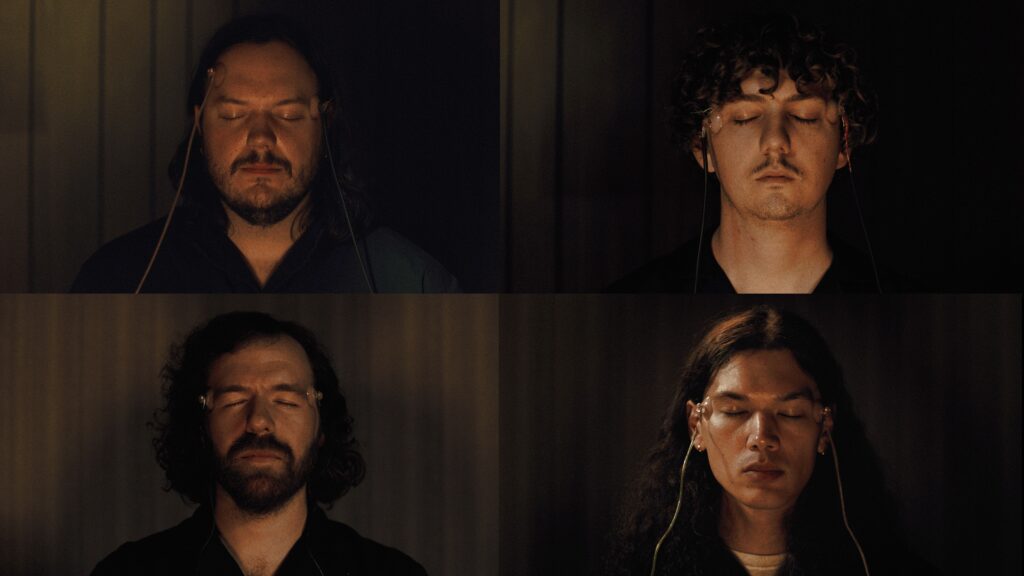
You said earlier that you wanted this album campaign to focus on you guys as a band and to not be defined by an overarching narrative. Given that it was written during the pandemic, did you have to emphasise to your PR team that this is not a ‘pandemic record’?
DM: It’s really funny you say that, because that sentence almost came out verbatim. “This is not a pandemic record, do not frame it to anybody that way!” But also, I think at least, it doesn’t feel like a pandemic record. There are certain bands who released an all acoustic record, or only used a drum machine. But Shiraz is an amazing drummer, and he’s a very key focal point of the band. So even writing with a drum machine, you still want to get his influence and approach to things when we get in the studio. But I think there are some other recent records where you just hear a super simple pre-programmed drum machine playing behind a track and you can tell they definitely wrote it in the pandemic. I think one thing about pandemic records is that it’ll be interesting to see the shelf-life of some of them. I think a lot of them will just feel like a stopgap before the artist does something else that’s fully realised. I feel confident that this doesn’t just feel like that. This feels like an evolution in what we’re doing.
KF: We had some songs, too, that I remember working on when we were able to practice again in fall 2020. I remember revisiting them a year later and being just like, “what were we feeling?” There are certain things that just didn’t translate. That’s the weird feeling we all had for, you know, not talking to anyone for six months. So some of it worked and some of it didn’t.
DM: Yeah, one other thing I think I’ll add is that there are some songs that didn’t make the record that actually did kind of just sound like pandemic songs. It’s like a one note vibe, where it’s just kind of cruising. Sometimes it’s cool, but when you’re riding one chord and doing stuff around it, sometimes it doesn’t work. We tried to pick the things that were a little more compelling and intriguing to us.
Just from their titles alone, Auto-Pain suggests a world of suffering, whereas Careful! sounds cautious, obviously, but there’s room for positivity and safety. Likewise, there are some peppy and fun moments on the new album, but also lines such as “I feel the violence.” What were some of the forces shaping Careful!?
DM: One thing I thought about in the pandemic is how our worlds were narrowed. What became important were our relationships with our friends, our family – the people that were in your “bubble”. So I think the narrowing of worlds made us think about what was the most important in our lives. You don’t even know all the bands that probably broke up over the pandemic or just slowly fizzled out. For me, just thinking about how important the band is, how important playing music is, was really pivotal. Not only to keep us going through the pandemic, but also just to kind of reaffirm what we want from our lives – playing music and finding meaning in that. The sentiment on the closing track ‘Pressure’ is related to that, the notion of looking out for each other. I think that’s something we really wanted to convey on Careful!, and part of the reason we put the exclamation point, is if you read the word without the exclamation point, it can have such a different tone. The exclamation point, to me, is like, “hey, I care about you, I’m looking out for you.” Not like a cautious “slippery when wet” floor sign or something. I think also, as with the working titles being the final track names, this is a record about the process of playing music, and finding solace and meaning in that. Finding the good in troubling times.
KF: In the title, and in a lot of Nick’s lyrics as well, there are moments of reflection on who you’ve been and who you want to be. I don’t want to say we have a wisdom about it, but there are experiences that we’ve drawn on over the years that you can try to learn from. Or at least use to help figure out who you want to be, or how to be good for the people around you.
You signed to Sub Pop for this record – tell me about the transition and what you hope or think that’ll add to the next step of the band.
Actually, it’s really fitting that we’re talking to you right now. It was almost exactly a year ago, at Pickathon 2022, in Oregon, that we started talking to Sub Pop Records. That festival kicked off the relationship that ended up becoming what it is today. It’s exciting to think about the history of the label and all the other amazing artists that they’ve worked with in the past, and even our peers and labelmates. It’s been a while since there was another Chicago-based Sub Pop band, so it feels really special in that regard, as well. The team has been awesome. One of the worries about moving to a larger label was if we were going to get the same sort of family feel that we did with Fire Talk, who were amazing. The nice thing about moving to Sub Pop is this feeling that we have this whole crew of people who are just so passionate about music, and still really understanding and easygoing. So we’re still getting some of that family feel while having a little more infrastructure around the release, which is really cool.
